UN Women advocates for gender equality at 4th International Conference on Small Island Developing States
Date:
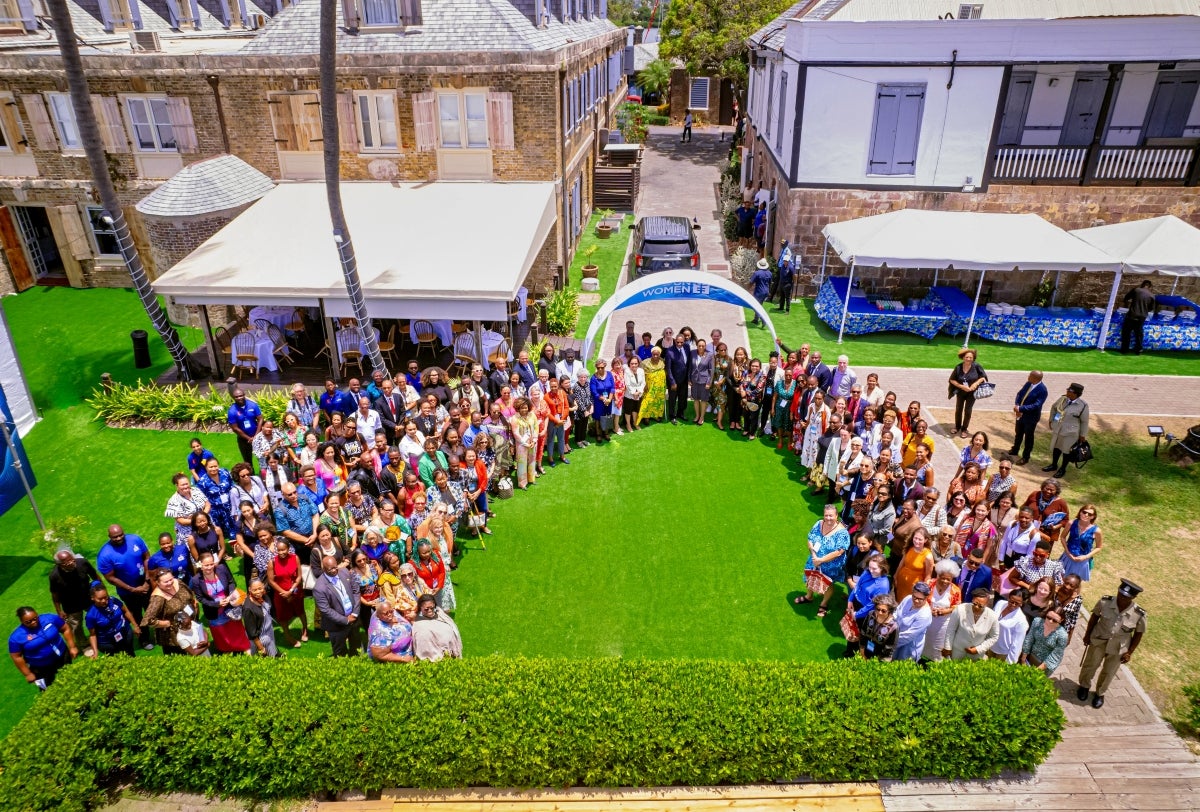
31 May 2024 - Small Island Developing States (SIDS) have assumed unique leadership roles in areas such as climate action, disaster risk reduction, and the protection of the world’s oceans. These small islands hold countless opportunities for resilience-building that can propel their progress and achievements towards sustainable development.
They also face unique vulnerabilities. SIDS are enduring the impacts of climate change, biodiversity loss, pollution, disasters and natural hazards, and social and economic crises. And despite notable progress towards gender equality, SIDS have distinctive challenges that hinder women and girls’ empowerment and their rights.
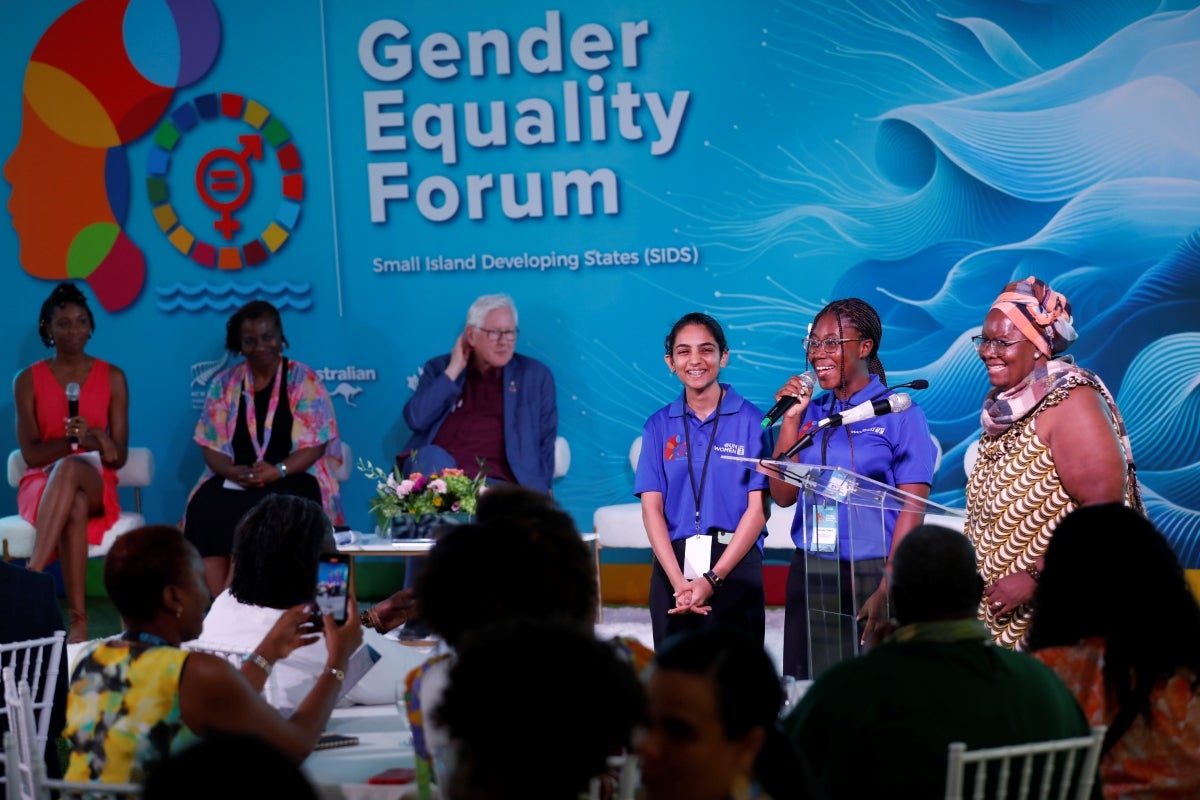
(Right to left): DED Nyaradzayi Gumbonzvanda and young women volunteers. Photo: UN Women/Ryan Brown.
Achieving gender equality in SIDS demands a response that overcomes the nations’ obstacles and transforms their vulnerabilities into tools of resilience, innovation, and equality.
12%
Only 12 per cent of SIDS maintain gender-specific data, crucial for assessing and addressing gender issues
$94.3B
From 2010 to 2019, SIDS suffered losses of USD 94.3 billion due to weather, climate, and water-related hazards
4.7x
The cost of delivering aid in SIDS is 4.7 times higher than in other countries due to their remoteness
Source: SIDS Conference fact sheet
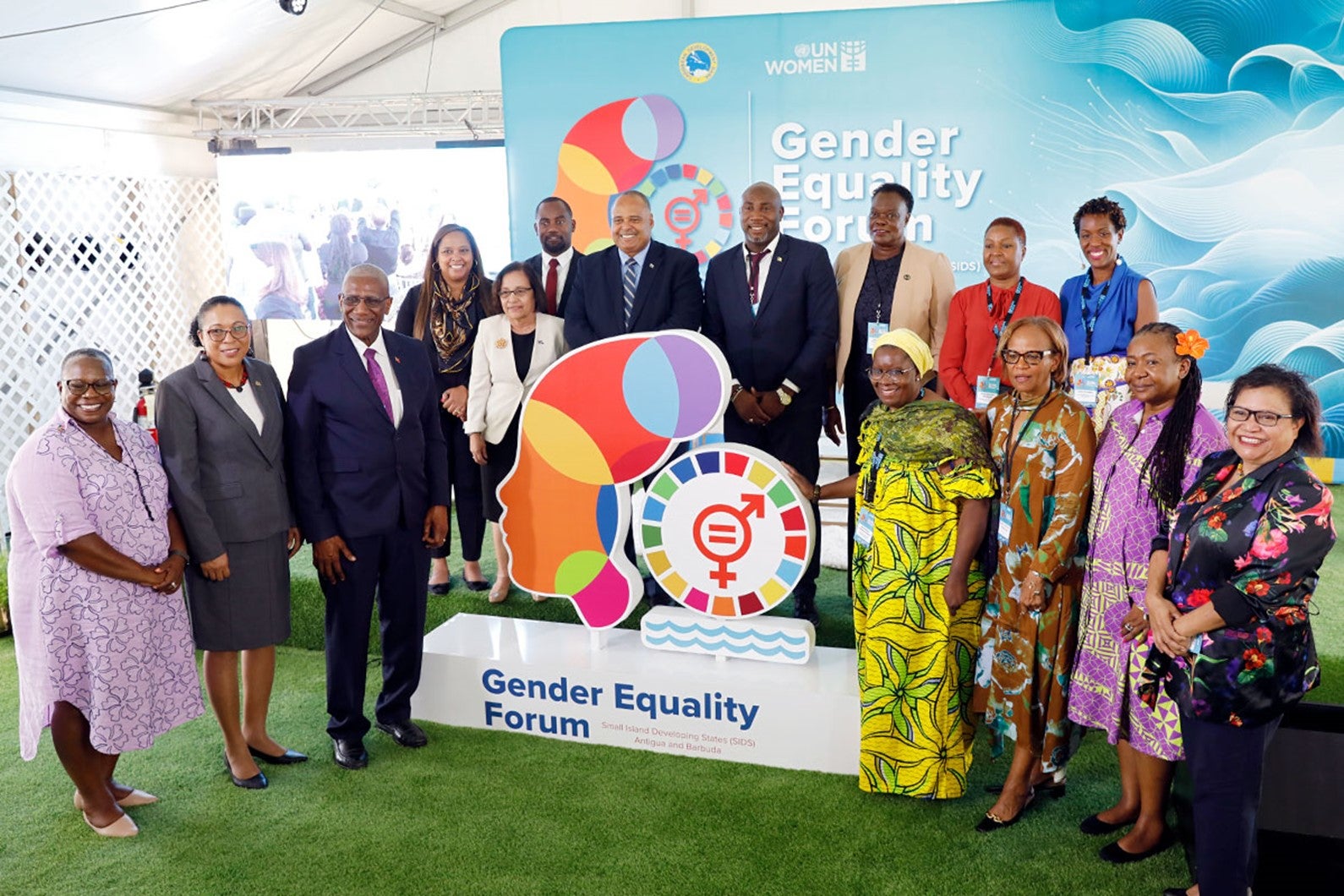
UN Women Multi Country Offices - Caribbean and Fiji together with the Government of Antigua and Barbuda and the Caribbean Development Bank, hosted the first ever Gender Equality Forum – a Special Event to the SIDS4 Global Conference. (4th right - front row/right of the monument) Deputy Executive Director Nyaradzayi Gumbonzvanda, Representatives Tonni Brodber (right – back row) and Delphine Serumaga (front row 2nd from right) were joined by (from left front row) Honourable Samantha Marshall, Minister - Ministry of Social Transformation, Human Resource Development, Youth and Gender Affairs – host Minister, Antigua and Barbuda; Her Excellency Sylvanie Burton – President, Commonwealth of Dominica; His Excellency Sir Rodney Williams – Governor General of Antigua and Barbuda; Her Excellency Hilda Heine, President - The Republic of the Marshall Islands (back row, 2nd from left); Therese Turner-Jones, Vice President, Operations (Ag) - Caribbean Development Bank (3rd right – front row); The Honourable J. Uduch Senegebau Senior, Vice President - Republic of Palau (farthest right), and Caribbean ministers with responsibility for gender. Photo: UN Women/Ryan Brown.
That is why UN Women co-hosted a Gender Equality Forum from 25 to 26 May in Antigua and Barbuda, ahead of the fourth International Conference on SIDS (SIDS4) with the Caribbean Development Bank. The forum featured more than 200 stakeholders from more than 40 countries, who represented a wide range of constituencies and sectors committed to keeping gender equality at the centre of the SIDS agenda.
The forum called on attendees to SIDS4 to ensure that gender equality, women’s human rights, and the empowerment of women and girls were prioritised, by mainstreaming gender equality in respective national plans and policies.
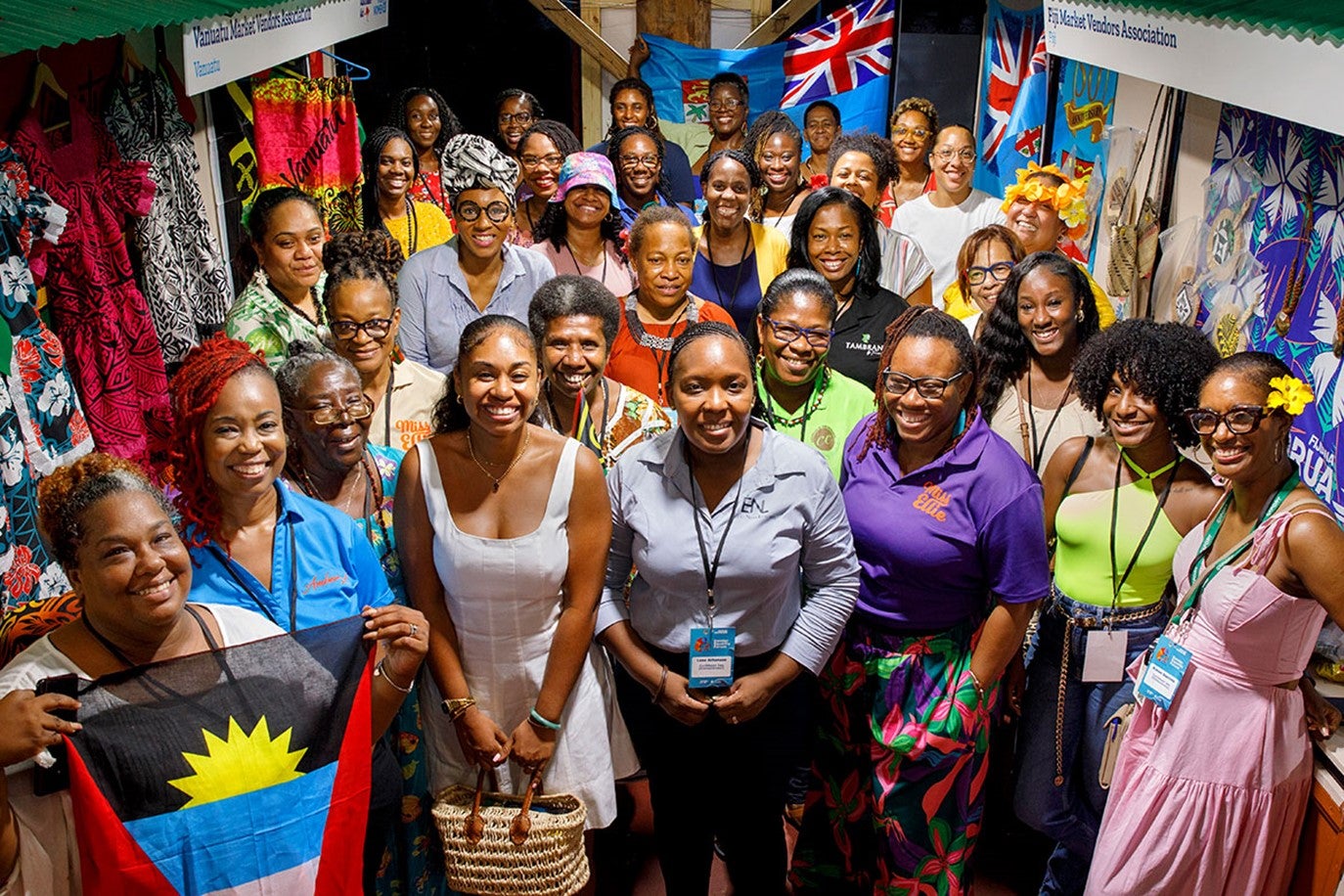
Women business owners at the Entrepreneurial Marketplace that took place during the SIDS4 GEF: UN Women Photo/Ryan Brown.
When SIDS4 commenced on 27 May, under the theme of “Charting the course toward resilient prosperity,” UN Women continued to press for women’s rights by hosting side events on climate resilience and investing in women as first responders to climate crisis; just financing; linkages between climate, gender, and racial justice; the role of digital art in SIDS; and women human rights defenders.
UN Women representatives also engaged in high-level meetings with representatives from SIDS including Antigua and Barbuda, Aruba, Barbados, Samoa, Haiti, Palau, and the Marshall Islands, as well as from international organizations including the Caribbean Development Bank and CARICOM Secretariat. At a civil society forum, a coalition of civil society groups and international agencies launched the SIDS Civil Society Action Plan and Roadmap to better support civil society organizations.
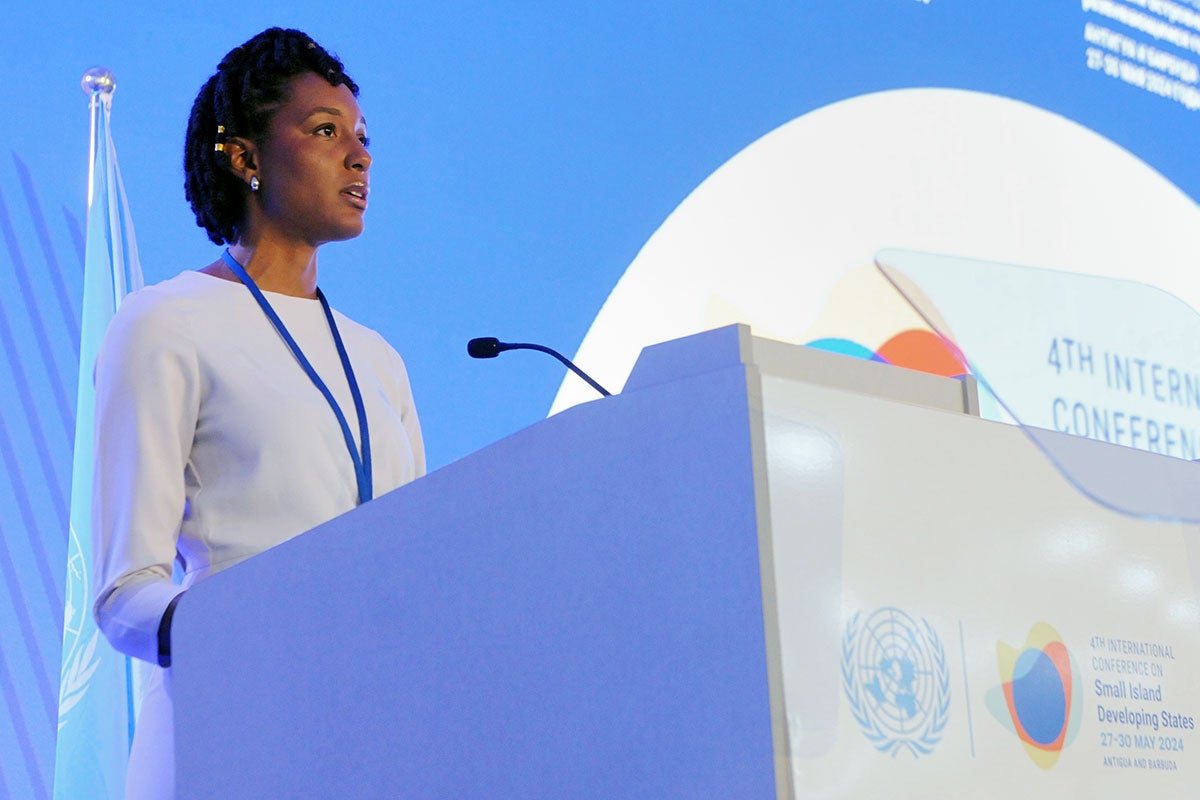
Meghan Theobalds, Equality Fund, reports on the SIDS Gender Equality Forum. Photo: IISD/ENB - Diego Noguera.
A summary of the Gender Equality Forum was reported at the conclusion of the conference on 30 May, when parties formally agreed to the Antigua and Barbuda Accord for SIDS (ABAS) - Renewed Declaration for Resilient Prosperity for SIDS.
The ABAS covers a wide array of topics, from economics and trade to tourism and aquaculture. Across these areas, the agreement reaffirms the importance of gender equality and women’s empowerment, and recognizes their multiplier effects on sustainable development. The agreement also calls for the promotion and protection of women and girls’ human rights, and for the elimination of all forms of violence against all women and girls.
SIDS’ vulnerability to environmental degradation, climate change, and economic crisis has hindered women and girls’ empowerment and their rights. The agreement calls to build more robust governance to handle hazards and risks, including through actions that are gender-responsive and disability-inclusive.
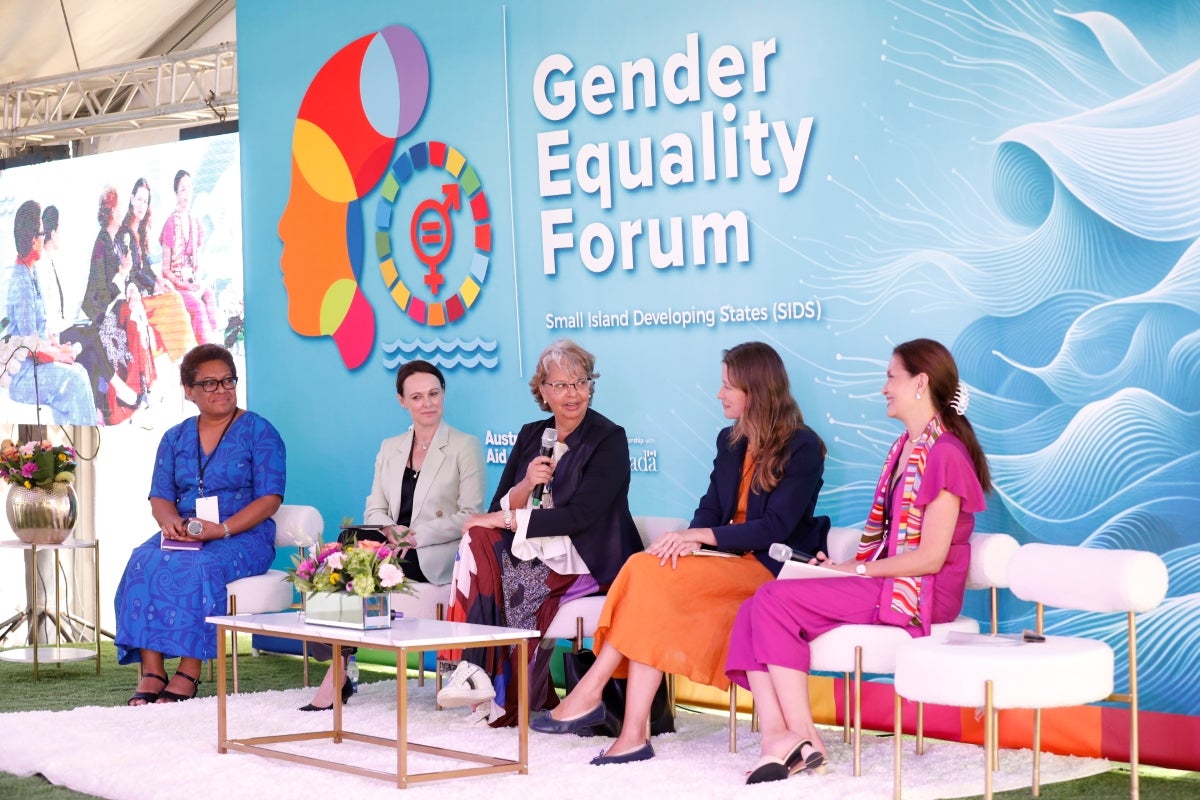
Private sector discussion (moderated by Patricia Francis, Chairperson, Trade Facilitation Task Force, Government of Jamaica and Director, Whiteshield Global Advisory Firm, third from left), featuring (far left to right) Mereseini Rakuita, Principal Strategic Lead, Pacific Women Lead, Pacific Community; Kerry Scott, Chief People Officer and Senior Vice President, Liberty Latin America; (far right to left) Samantha Hung, Director, Gender Equality Division, Climate Change and Sustainable Development Department, Asian Development Bank; and Kristina Eisele, Representative for the Southern and Eastern Caribbean, European Investment Bank. UN Women Photo/Ryan Brown.
UN Women welcomed the adoption of the ABAS, and vowed to support its implementation across the 39 SIDS. Particularly noteworthy is the agreement’s high elevation of gender equality, a result of deliberate proposals to advance the lives of women and girls in SIDS.
“This SIDS conference showed the that small countries are hugely significant. This agreement places people and planet before profit, and its implementation must give a much-needed boost to these countries’ women and girls,” said UN Women Deputy Executive Director Nyaradzayi Gumbonzvanda, who attended the conference.
“Countries must build on this agreement to ensure that women lead the development and implementation of policies on all topics, from climate change to economic development,” she said. “Only by upholding gender equality and the empowerment of women and girls can SIDS rise to the serious challenges they face.”
The Gender Equality Forum Communiqué can be accessed here.